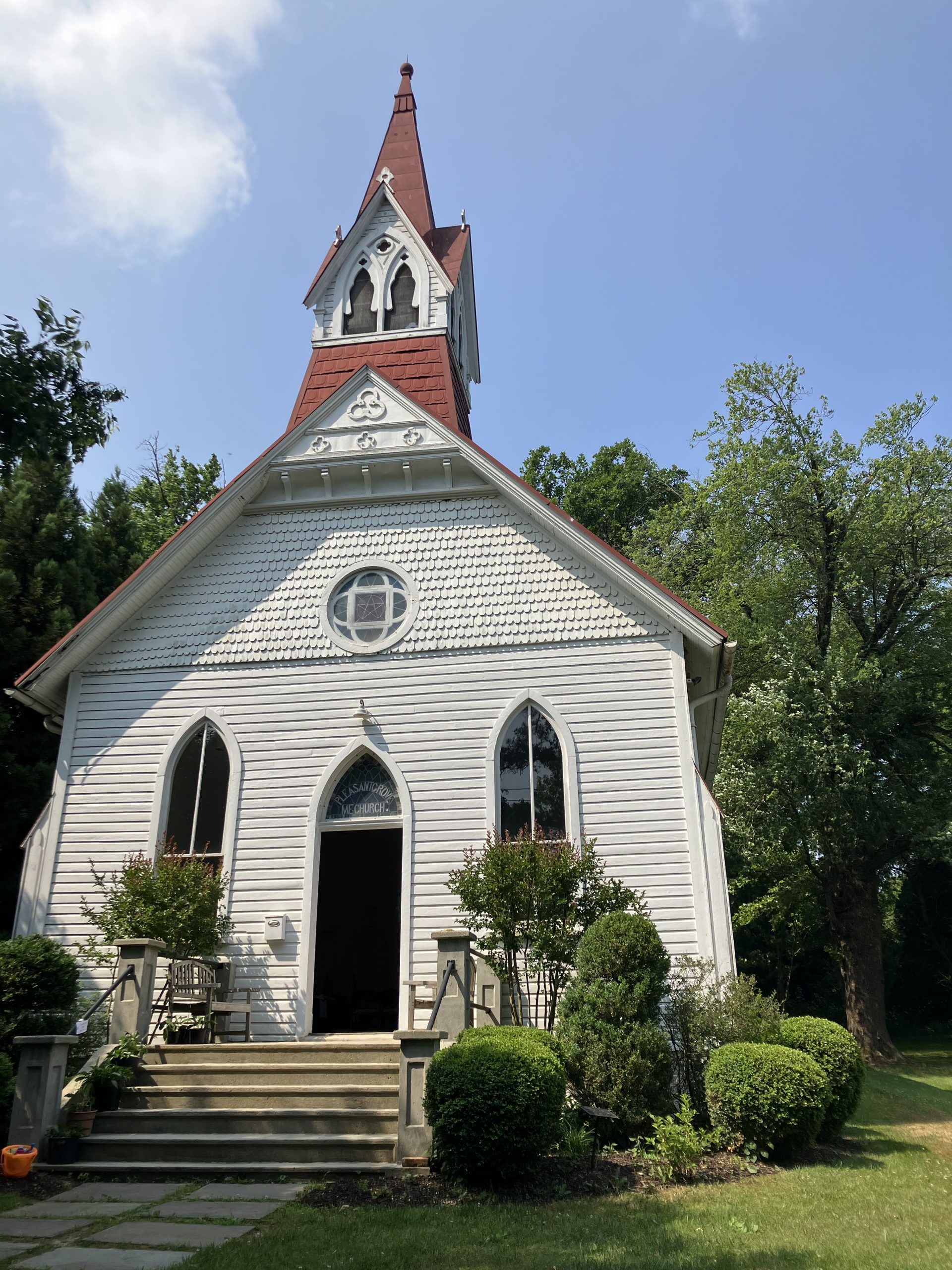
On Saturday, June 17, Historic Pleasant Grove Church, an historic site and museum, held their annual Spring Fair and Open House. Pleasant Grove is located at 8641 Lewinsville Road, McLean, Virginia 22102, just on the outskirts of Tysons.
As described on their website: “Historic Pleasant Grove is a community landmark in McLean, Virginia built by and for African and Native Americans in the late 19th century. No longer an active church, the simple-yet-striking Carpenter Gothic structure is an historic site managed by the Friends of Pleasant Grove, who foster diversity through free cultural events throughout the year, operate the on-site museum, and rent the space.”
Some of Pleasant Grove’s founding families’ members are buried on the property, including members of the Sharper family. On the day of the open house, I took time to really appreciate the Carpenter Gothic Architecture and craftmanship of Lewis Henry Sharper, the master carpenter who led much of the work on the building. I also learned that among Pleasant Grove’s founding families were members of the Pamunkey Native American Tribe, including John Mills who also helped build the structure.
My husband, Tyler, and I (and our dog Scrappy) were also pleased to speak with Michelle Arcari, Board President of the Friends of Pleasant Grove. We learned about the history of the organization, their on-going work to preserve the structure and the history of the community, as well as their efforts to promote cultural diversity through events held throughout the year.
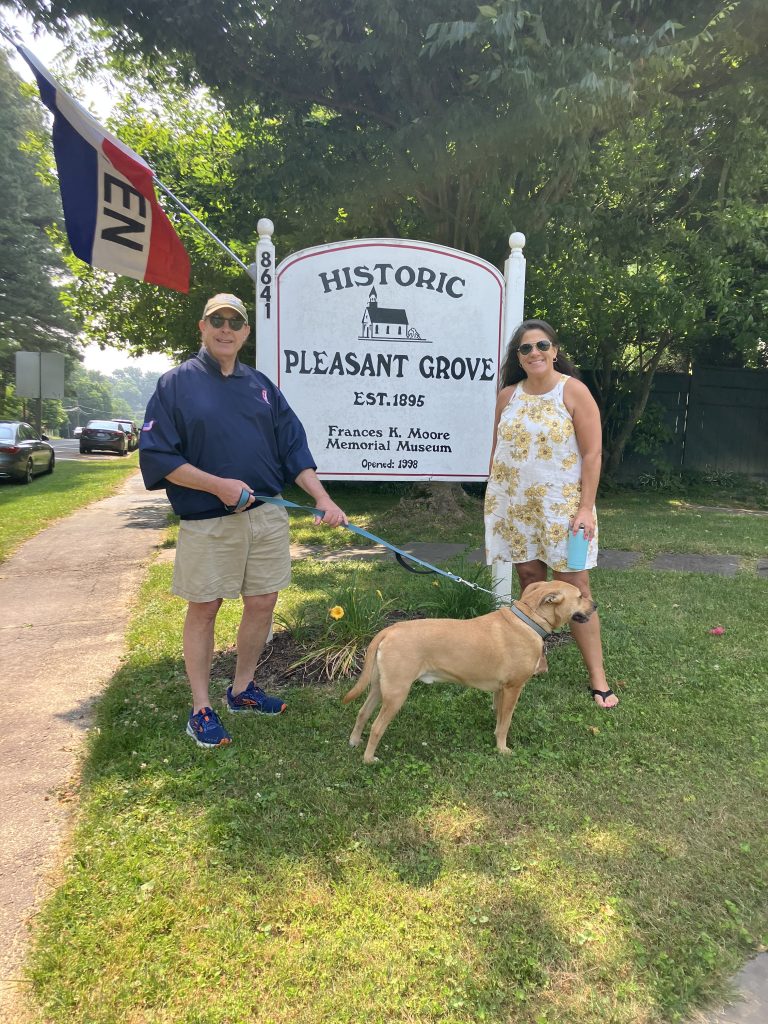
Pictured: Tyler Posey, Michelle Arcari and Scrappy Posey
To learn more about this historic gem in our midst and upcoming events public events planned at the site, I encourage you to visit Historic Pleasant Grove’s website at historicpleasantgrove.org/.
This blog post is the expressed opinion of its writer and does not necessarily reflect the views of Tysons Interfaith or its members.

An article I read from the Stanford Center for Longevity notes that there is a relationship between volunteering and improved physical health and cognitive function. “Research also shows that volunteers report elevated mood and less depression, and that volunteers report increased social interactions and social support, better relationship quality, and decreased loneliness.” longevity.stanford.edu A contributor to Deseret News had this to say about her volunteer experience: “I’ve experienced the boost in happiness, the sense that I was part of something bigger. I made friends, formed connections that I still have to this day, and I felt more optimistic about the world when I was surrounded by people who, like me, were trying to help others.” deseret.com/coronavirus/2022/4/17.
Of course, volunteering strengthens communities as well. As people of different backgrounds come together to serve our neighbors, we discover that we have much more in common than we ever imagined. Whether it is donating our time, talents or resources, each selfless act truly does help make the world a better place.
Want to learn more about some of the non-profits doing phenomenal work in the Tysons area? Spring and summer 2023, Tysons Interfaith will present a series of blog posts highlighting local organizations that are working to improve the lives of our neighbors. Please look for these periodic posts, or feel free to visit the Tysons Interfaith Resources Page for a comprehensive list of non-profit organizations in our area: tysonsinterfaith.org/resources.
This blog post is the expressed opinion of its writer and does not necessarily reflect the views of Tysons Interfaith or its members.
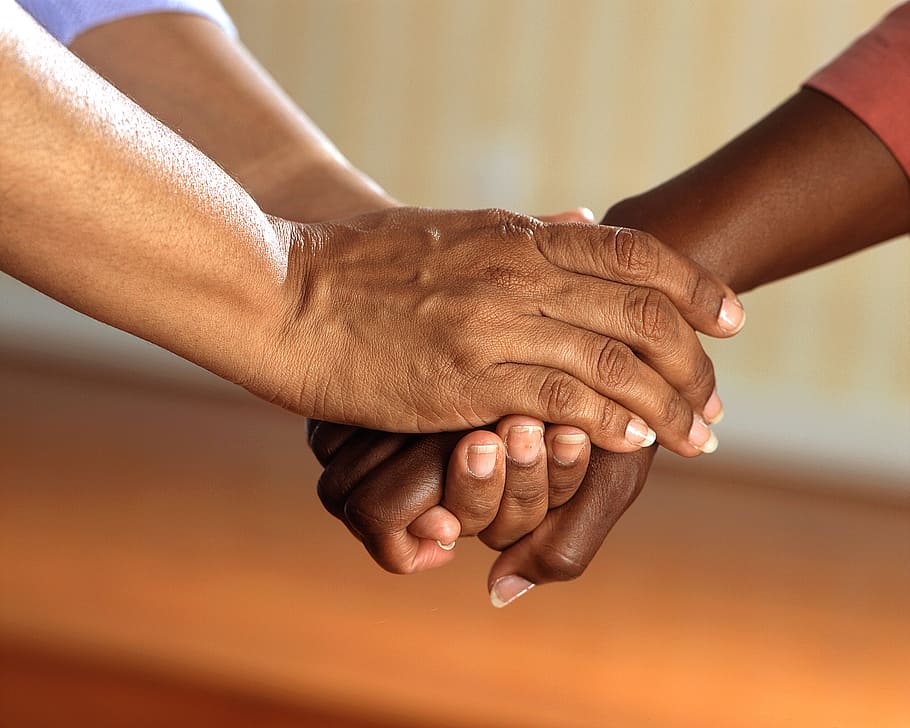
What is your “worldview”? What do you hold dear? The answers to these questions are both the composite and the creator of your attitudes, values, stories, and expectations about your world and the world around you. They inform your every thought and action. Your worldview manifests as your ethics, religion, philosophy, and beliefs.
We arise from our cultures of origin, so we are a product of that culture, and we have everything that is necessary to be the producers of new cultures. Humans have been creating cultures since we first walked the earth.
Are you a “glass-half-full” person – an optimist that sees the positive in everything, or a “glass-half-empty” pessimist that goes to the darker side, thinking the worst of any situation? Most of us vacillate between the two depending on context.
If you had magical powers (which, of course, you do), what culture would you create? Would it be utopian? Would everyone get along without challenges or disagreements? Would it be so peaceful that terminal stasis might set in? Or would it be a world in which citizens are truly free to think independently, to share the breadth of their creativity, to debate respectfully, challenge other’s opinions without fear, collectively focusing on solutions and constructive evolution? Could a world of health, harmony, and unconditional high regard that supports everyone in living their best yet to be, prevail?
Thousands of people gathering in small groups are responding to the heart-call to create a world that works. In the interfaith world, we are creating a culture of connection that begins with compassionate curiosity. We are concerned about others’ experiences and encourage everyone to learn with and from one another. Kindness, stemming from mutual respect, is blossoming. Curiosity, which plays a huge role in how we relate to our world, is the strong desire to learn something more, something new. Our willingness to reach beyond the culture in which we were raised depends on our internal sense of safety blended with the divine urge to experience the unknown. Our culture of origin instilled acceptable and customary beliefs and social forms and formulas in us. We unconsciously embraced the material traits of our racial, religious and social groups. This worldview has out-pictured as our everyday existence – our way of life and the people with whom we share our lives. It is how we relate to all creation, our chosen diversions, the places we reside and our travels. As years have passed, some have stayed deeply linked to those original perspectives. Most of us have evolved, some more than others.
Some people look at the world and see it fractured, fragmented into myriad separate pieces. All they see are differences: different skin color, different size, shape, ethnicity, religion … different climates, different architecture. Different everything. Theirs is a world of “me and us” versus “other” – constantly contrasting what they believe to be known and safe with all that is different. The leap to an assumption that “different is dangerous” is all too easy. Gripped in fear, “fight, flight or freeze” instinctive, defensive reactions take over. Resourcefulness disappears.
Others, drawn by our common human desire to connect, may be challenged to find ways to relate to those individuals and groups that don’t align with our worldview. When confronted with personalities and appearances unlike ours, we may fumble and experience a jumble of emotions, yet continue to pursue connection. We experiment. Some of our tries turn out to be life-affirming and others quite opposite, and we don’t give up. We look around and note in awe and wonder, the myriad distinction of creation in expression. We drink in commonalities and celebrate all the differences. We recognize that we are looking at the same world through different subjective filters.
Commonalities prevail throughout nature. We are all made of the same stuff. For the most part, it is only when personality, rather than physicality, is brought into the equation that concerns about “different” crop up. Distinctions within commonalities are what make Life rich. Innate distinctions are what express as myriad appearances, gifts, talents, and desires.
The tension of opposites – the pull and push of life – stirs creativity. New solutions, new ways of being together are revealed. The Divine Urge within each of us desires to resolve conflict and harmonize our world. Coming together across myriad cultures and faith traditions, contemplating co-existence, I hear within me, Elizabeth Barrett Browning’s “How do I love thee? Let me count the ways.” What if we were to ask, “What do we have in common? Let me count the ways.” I am sure we would discover ways to love one another. And, what if in love, we were to ask, “Tell me how it is to be you, your life, and those you love.”
Ernest Holmes shared what won’t work: “You cannot draw love into your consciousness through hate. You cannot draw peace from confusion. You cannot see beauty through ugliness, nor hear harmony while your ears are filled with discord.” So what will work?
We must develop a Culture of Connection! It may be easier than you think, here are some simple steps:
- Embrace your desire to create a Culture of Connection and commit to doing your part
- Set your intention to consistently be present in your conversations
- Silence our fear-mongering self-talk to the best of your ability
- Enter a consciousness of Love because it is contagious
- Express genuine, compassionate curiosity
- Initiate conversations – talk to strangers even though your mother told you not to.
This blog post is the expressed opinion of its writer and does not necessarily reflect the views of Tysons Interfaith or its members.
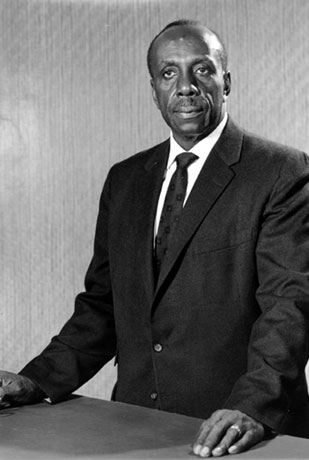
In recognition of Black History Month, I commend to you this prayer by Howard Thurman:
Lord, Lord, Open Unto Me
Open unto me, light for my darkness
Open unto me, courage for my fear
Open unto me, hope for my despair
Open unto me, peace for my turmoil
Open unto me, joy for my sorrow
Open unto me, strength for my weakness
Open unto me, wisdom for my confusion
Open unto me, forgiveness for my sins
Open unto me, tenderness for my toughness
Open unto me, love for my hates
Open unto me, Thy Self for myself
Lord, Lord, open unto me!
Thurman was born in 1899 and raised in the segregated South. He is recognized as one of the great spiritual leaders of the 20th century renowned for his reflections on humanity and our relationship with God. Thurman was a prolific author (writing at least 20 books); perhaps the most famous is Jesus and the Disinherited (1949), which deeply influenced Martin Luther King, Jr. and other leaders of the Civil Rights Movement. Thurman was the first black person to be a tenured Dean at a PWI (Boston U). He also cofounded the first interracially pastored, intercultural church in the US.
Source: https://www.xavier.edu/jesuitresource/online-resources/prayer-index/prayers-for-black-history-month1
This blog post is the expressed opinion of its writer and does not necessarily reflect the views of Tysons Interfaith or its members.
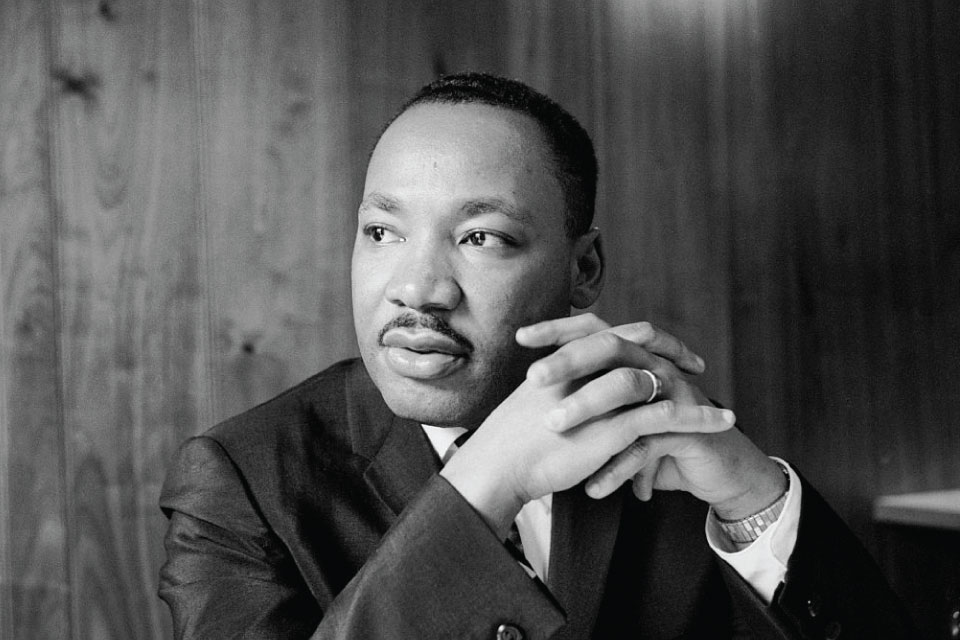
At a recent Tysons Interfaith meeting, my friend Reverend Trish Hall opened the gathering by reading an excerpt from the Martin Luther King Jr.’s 1967 address to the Southern Christian Leadership Conference entitled, “Where Do We Go From Here.”
You know words are timeless when they strike a chord and send a chill down your spine. Trish read the opening passage of this excerpt to us:
“I’m concerned about a better World. I’m concerned about justice; I’m concerned about brotherhood and sisterhood; I’m concerned about truth. And when one is concerned about that, he can never advocate violence. For through violence you may murder a murderer, but you can’t murder murder. Through violence you may murder a liar, but you can’t establish truth. Through violence you may murder a hater, but you can’t murder hate through violence. Darkness cannot put out darkness; only light can do that.
And I say to you, I have also decided to stick with love, for I know that love is ultimately the only answer to humankind’s problems. And I’m going to talk about it everywhere I go. I know it isn’t popular to talk about it in some circles today. And I’m not talking about emotional bosh when I talk about love; I’m talking about a strong, demanding love. For I have seen too much hate. […] and I say to myself that hate is too great a burden to bear. I have decided to love. If you are seeking the highest good, I think you can find it through love. And the beautiful thing is that we aren’t moving wrong when we do it, because John was right, God is love. He who hates does not know God, but he who loves has the key that unlocks the door to the meaning of ultimate reality.
And so I say to you today, my friends, that you may be able to speak with the tongues of men and angels; you may have the eloquence of articulate speech; but if you have not love, it means nothing. Yes, you may have the gift of prophecy; you may have the gift of scientific prediction and understand the behavior of molecules; you may break into the storehouse of nature and bring forth many new insights; yes, you may ascend to the heights of academic achievement so that you have all knowledge; and you may boast of your great institutions of learning and the boundless extent of your degrees; but if you have not love, all of these mean absolutely nothing. You may even give your goods to feed the poor; you may bestow great gifts to charity; and you may tower high in philanthropy; but if you have not love, your charity means nothing. You may even give your body to be burned and die the death of a martyr, and your spilt blood may be a symbol of honor for generations yet unborn, and thousands may praise you as one of history’s greatest heroes; but if you have not love, your blood was spilt in vain.
What I’m trying to get you to see this morning is that a man may be self-centered in his self-denial and self-righteous in his self-sacrifice. His generosity may feed his ego, and his piety may feed his pride. So without love, benevolence becomes egotism, and martyrdom becomes spiritual pride.“
Martin Luther King Jr. Day (Monday, January 16) is a nationally designated day of service. Whether you participate in an organized event, reach out a helping hand to a friend or neighbor, or offer an unexpected uplifting smile to another person, thank you for deciding to stick with love.
Looking for additional ways to observe the holiday? Reverend Trish Hall will be a contributor at the Unitarian Universalists Church of Arlington’s MLK 2023 Weekend of Remembrance.
This blog post is the expressed opinion of its writer and does not necessarily reflect the views of Tysons Interfaith or its members.
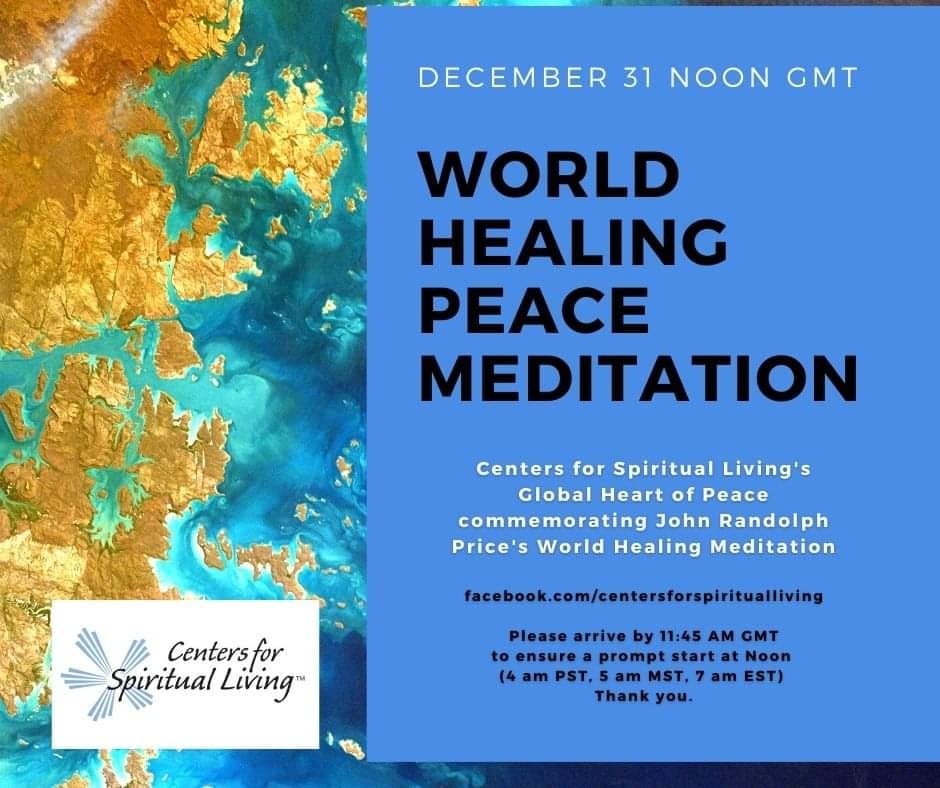
We are imbued with the ability to use the most powerful healing force in the universe: Love. It cannot be destroyed. It can be ignored. By denying its power, we cause ourselves and others pain. Embracing it is the only answer. Through the power of love, we can release ourselves from history’s entanglements and begin again. Love heals and makes whole.
Embarking on this transformative journey of shifting from individual moments of peace to continuities of peace, we must release attachment to how it’s always been, how we want it to appear, and ready ourselves so that Divine Possibility can have its way with us. An ancient Zen story provides guidance. It tells about a university professor who went to visit a famous Zen master. While the master quietly served tea, the professor talked about Zen. The master poured the visitor’s cup to the brim, and then kept pouring. The professor watched the overflowing cup until he could no longer restrain himself. “It’s full! No more will go in!” the professor blurted. “This is you,” the master replied, “How can I show you Zen unless you first empty your cup.” We must empty ourselves so that we are available to new learning and new experiences.
We are always at choice: the choice of how we are to be in each and every situation, the choice to be a conscious activity of God, the choice to apply spiritual principles to every circumstance, the choice to remember that the Truth that we know within must express into and as form, as circumstance, the choice to simply perpetuate our mistakes or learn from them and manifest our global vision of a world that works for all.
The Heart of Peace Initiative invites you to be a catalyst for global healing and sustainable peace, transforming moments of peace to continuities. You are encouraged to experiment with being a conscious presence as peace in a variety of settings and being kind and respectful when circumstances might lure you to be otherwise. We welcome you to meditate with us weekly on Facebook for Collective Peace Meditation at 1:00 PM (US Mountain Time) and for our array of other peace practices throughout the year.
Start 2023 by attending the World Healing Peace Meditation at 12:00 PM GMT December 31, 2022 (7am Eastern) on Center for Spiritual Living, Heart of Peace, Facebook Live. https://www.facebook.com/centersforspiritualliving/.
This blog post is the expressed opinion of its writer and does not necessarily reflect the views of Tysons Interfaith or its members.

By: Reverend Trish Hall, Centers for Spiritual Living Metro
It serves no purpose to deny what is happening globally and locally. Unless we acknowledge that there is a problem, we are powerless to make changes. How do we walk the tightrope of being fully engaged, committed to transforming the problem, yet not lose ourselves in the problem so that we become a force of separation? The passion that ignites our desire to manifest a world that works for everyone, can all too easily become divisive rather than unifying. Spirit stirs us to recognize that which needs to change, to seek solutions, to be impassioned to cause change, and to do so in ways that unite rather than separate us.
We receive conflicting messages: we must “feel it to heal it,” yet warned, “That which you focus upon expands in your experience.” Recognizing what needs to be changed demands that we look objectively at ourselves and circumstances. Simultaneously, we must feel it and sense it deeply, in order to muster the energy to be a cause for change yet not get so consumed by it that we lose perspective and become ineffective. We must place our focus on healing – to call forth the Divine Truth that shifts human experience at the level of cause. Divine Truth does not deny circumstances. It provides the means to effect lasting change of circumstances. It diminishes the human propensity to get distracted and waste energy on behaviors that widen rifts and entrench the sense of separation. It calls us to be healers – unifiers that dissolve the sense of separation.
So what is “healing”? The simple answer is to make whole. We must reunite our divided nature, releasing our fixation on what is wrong with the world and opening to pure potentiality – to accepting responsibility for doing our part to heal ourselves and the world. Sometimes in the midst of chaos, it is hard to see “Truth beyond appearances.” Sometimes, it is hard to remember when surrounded by alligators, that we are there to drain the swamp – to remember it is the Truth that sets us free from the alligators.
Ernest Holmes declared, “We have within us, a power that is greater than anything we shall ever contact in the outer, a power that can overcome every obstacle in our life and set us safe, satisfied and at peace, healed and prosperous, in a new light, and in a new life.” Simply because we have it is no assurance that we use it for good purpose – that is a matter of choice. How then do we choose to be? Do we use this power peacefully, as compassion, healing of strife and global chaos or do we remain imprisoned by beliefs that global peace is not possible because it has not yet been experienced? Do we take responsibility for our past mistakes, learn from them, and redirect our thoughts and actions? Do we uproot our misplaced faith in the inevitability of that which is not desired, or do we embrace the power within and be catalysts for change – catalysts for peace?
It is time to subdue all inner conflict by giving no further attention to the many distractions – the side issues that divert us from the fulfillment of our goal. We achieve this by engaging all our thoughts and feelings in constructive, creative, and productive consciousness – by being peace.
Please consider joining us or the annual World Healing Meditation that commences precisely at 12:00 AM GMT (7:00 AM Eastern) on December 31st. You can do this individually, or in-person groups or join the Heart of Peace Initiative which provides an hour of inspiration including affirmations, meditation and readings focused on the realization of global peace, healing all aspects of the world, revealing peace at: facebook.com/events/716551799681145

Nelson Mandela: “Peace is not just the absence of conflict; peace is the creation of an environment where all can flourish regardless of race, color, creed, religion, gender, class, caste or any other social markers of difference.”
Deep within their beings, John Randolph Price and his wife, Jan, understood true Peace. They envisioned millions of people around the planet joining together in a “global mind-link” to heal the world and reveal peace, so they launched the World Healing Day, December 31, 1986. Their concept was clear – a moment in time in which the consciousness of millions would be linked in a single focus: A worldwide, congruent embodiment of healing and harmonizing Planet Earth. The power of such clarity in any moment is unstoppable. Recognizing the challenge of sustainability, they established it as an annual event strategically placed right before the start of each year. This year is the 37th annual gathering. It has grown consistently. Most people, once they have participated, feel the call to do it again and again.
The Heart of Peace Initiative of Centers for Spiritual Living Global Services took up the challenge to engage a mind-link, as the Prices had envisioned, to transmute moments of Peace into continuities. The Initiative’s vision sees millions of people diving into the consciousness of peace, healing, and harmony at random times as well as specific events, spontaneously reconnecting with the mind-link. The Prices believed, and we agree, that the sense of connection is a powerful factor in peace building.
There is a traditional African concept of humaneness, for caring, sharing and being in harmony with all of creation. In In Zulu or Xhosa, the term is “ubuntu.” A friend told me, “The concept is easy: I am because we are.” Peace arises when we connect with and care for one another. Whether we call it Amani (Swahili) or Ukuthula (Zulu) or Peace, we are intuitively drawn to it.
Alas, we humans tend to get distracted by the swirl of worldly circumstances. Often distractions trigger attitudes that are the antithesis of harmony. Yet, that innate desire within to connect stirs ever growing numbers of hearts to heal and allow peace to prevail. The undulating, rippling effect of this desire is contagious and lifts the consciousness within everyone, everywhere whether they are conscious of what is happening or not.
When we look around, the world – even our individual thoughts – seem rife with examples of discord, violence, and disasters. It can be overwhelming. The voice of doubt may raise its head, questioning, “What difference can I possibly make.” The answer is, “You make a world of difference! Every act of love, of kindness, of compassion ripples out touching and transforming others who consciously or otherwise do the same.” Just imagine the result if each one of us raised these simple acts to the level of commitment and took responsibility for the influence we have on others.
One of the things you can do is participate in the annual World Healing Meditation that commences precisely at 12:00 AM GMT (7:00 AM Eastern) on December 31st. You can do this individually, or in-person groups or join the Heart of Peace Initiative which provides an hour of inspiration including affirmations, meditation and readings focused on the realization of global peace, healing all aspects of the world, revealing peace at: facebook.com/events/716551799681145
This blog post is the expressed opinion of its writer and does not necessarily reflect the views of Tysons Interfaith or its members.
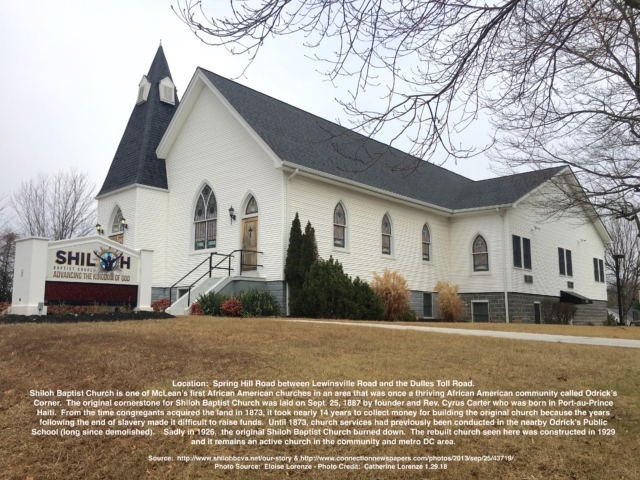
Shiloh Baptist Church, the beautiful church that sits on a rise just south of the intersection of Lewinsville Road and Spring Hill Road, celebrates 150 years of service to the community this year.
Founded in 1872 by Cyrus Franklin Carter, who also founded other churches in the area (First Baptist Church of Vienna and First Baptist Church Chesterbrook), Shiloh was central to the post-Civil War Odrick’s Corner Community. To read more about the history of the church, please visit shilohbcva.net/our-story.
To commemorate this special anniversary, Shiloh held a series of events including a community picnic in July, and a “Spotlight on Shiloh” event at the McLean Community Center in August. The celebrations culminated in a special worship service held on September 18.
The September 18 service, in addition to celebrating the church’s sesquicentennial, also recognized Rev. Dr. Robert F. Cheeks, Jr., and his wife, Minister Constance Cheeks, for their fifteen years of leadership to the congregation. It was a joyous occasion that included the presentation of a commendation from Fairfax County by Board of Supervisors Chairman Jeff McKay, and the reading of congratulatory messages from Governor Youngkin, the leadership of National Cathedral, and from Lewinsville Presbyterian Church which has been partnering with Shiloh Baptist in Bible study.
Shiloh Baptist is a member of Tysons Interfaith. At least four Tysons Interfaith communities were represented at the September 18 service. Pictured here at the service is Fazia Dean of Dar Al-Hijrah Islamic Center.
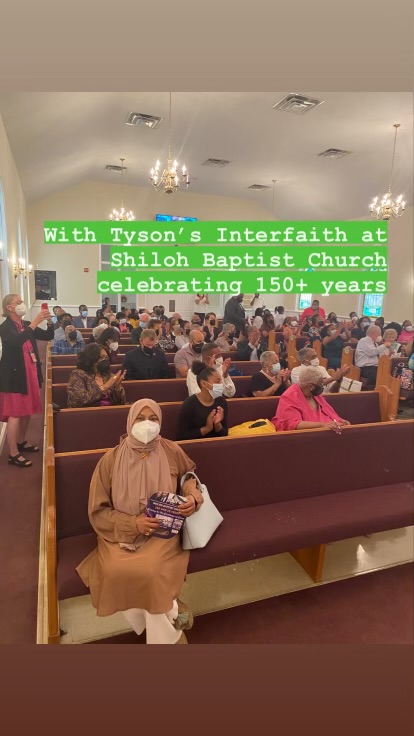
Tysons Interfaith congratulates Shiloh Baptist on their 150 years of enduring service to the local community. We look forward to continuing to partner with them to weave the values of spiritual connection, spiritual learning, mutual support, and community service into the fabric of the greater Tysons area.
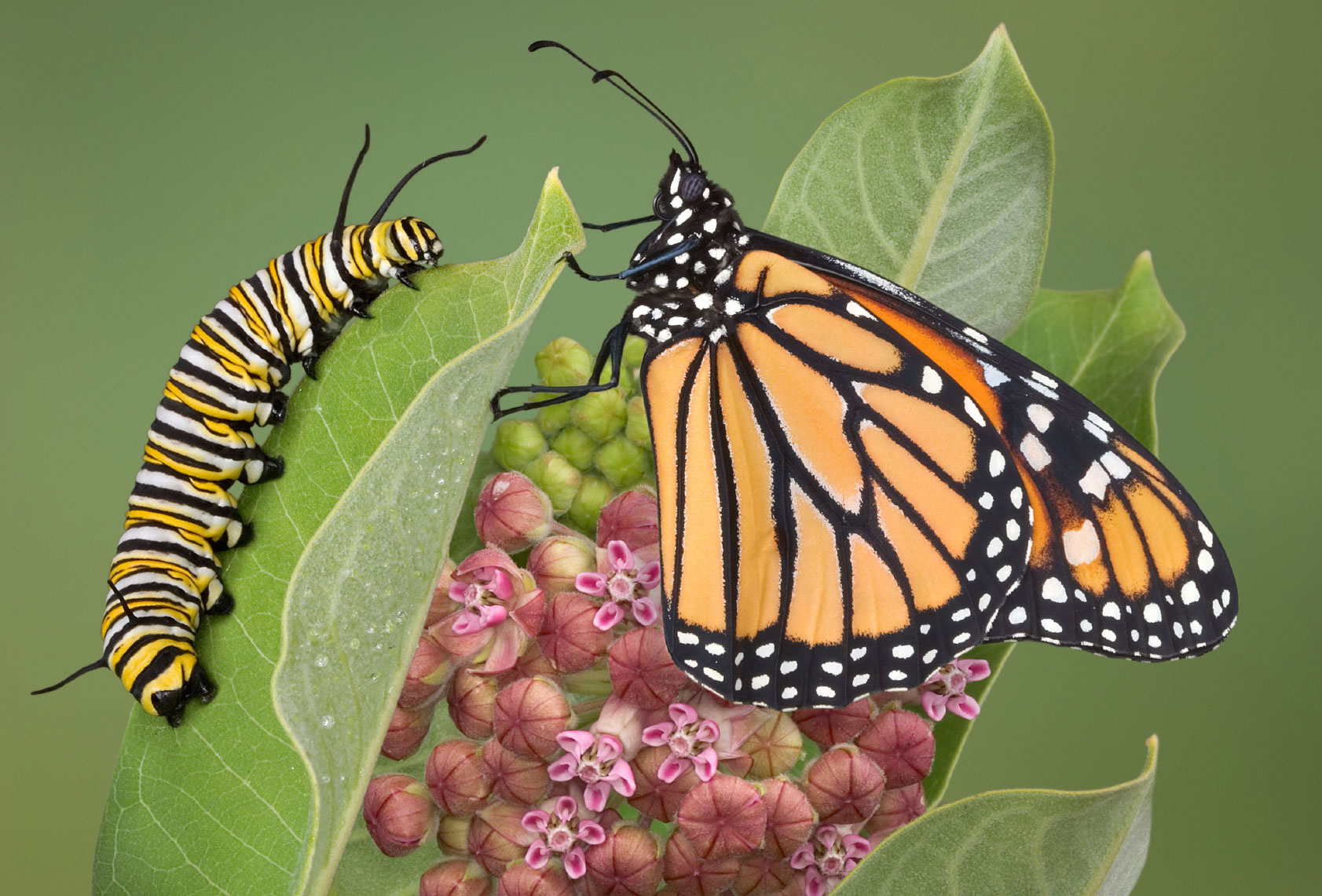
A recent lead article in the Christian Science Monitor Daily really caught my attention. On September 15, editor Mark Sappenfield published a piece entitled “Butterflies, capitalism, and the golden rule.”
Butterflies, capitalism, and the golden rule

Editor
| When the world gathers in New York next week for the United Nations General Assembly, Kim Polman will be there to talk about butterflies – kind of. Ms. Polman is co-founder of Reboot the Future, an organization built on the idea that the golden rule – cherished in various forms by all human cultures – is the basis for societal and economic transformation. Ms. Polman is not alone in thinking capitalism needs a reboot. On one hand, capitalism has generated unprecedented wealth, lifting wide swaths of the world out of poverty. But it is also at the basis of what some call the “death economy” – extractive and exploitative practices built on competition run amok. She’ll be in New York to discuss the new book she helped write, “Values for a Life Economy.” The key to pivoting from an extractive, exploitative capitalism to one that embraces all and the planet is recognizing our deep interconnection. “We are all connected, and we are all responsible,” she says. “We need to wake up to the idea that we are not just here for ourselves.” She’s talking about nothing less than a shift in our economic paradigm. From the days of Adam Smith, capitalism has been about how competition holds our lower natures in check. Can we really expect more of ourselves as humans? That’s where the butterflies come in. When the caterpillar starts its metamorphosis, its cells actively resist. It tries to stop the process. “But the cell that holds the vision of the butterfly is innate in the caterpillar,” she says. The ability to transform is already there, and it only becomes active under duress. For humans, she says, that visionary cell is the golden rule – the innate, natural impulse to treat others and the world the way you would wish to be treated. “Our work,” she says, “is to reach a tipping point.” |
Isn’t this a wonderful thought to be discussing at the United Nations? An economic paradigm shift based on a deeper understanding of the Golden Rule.
